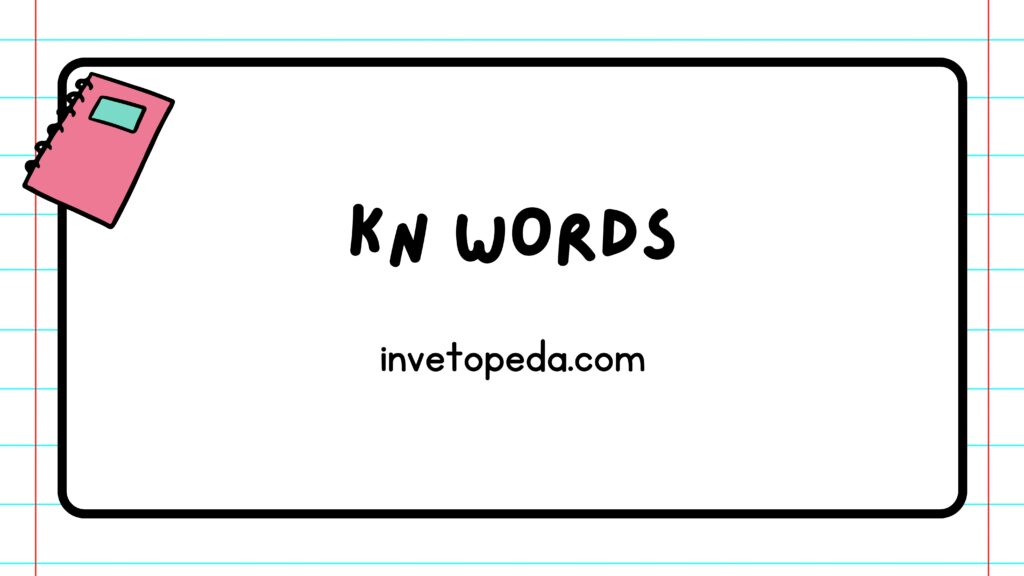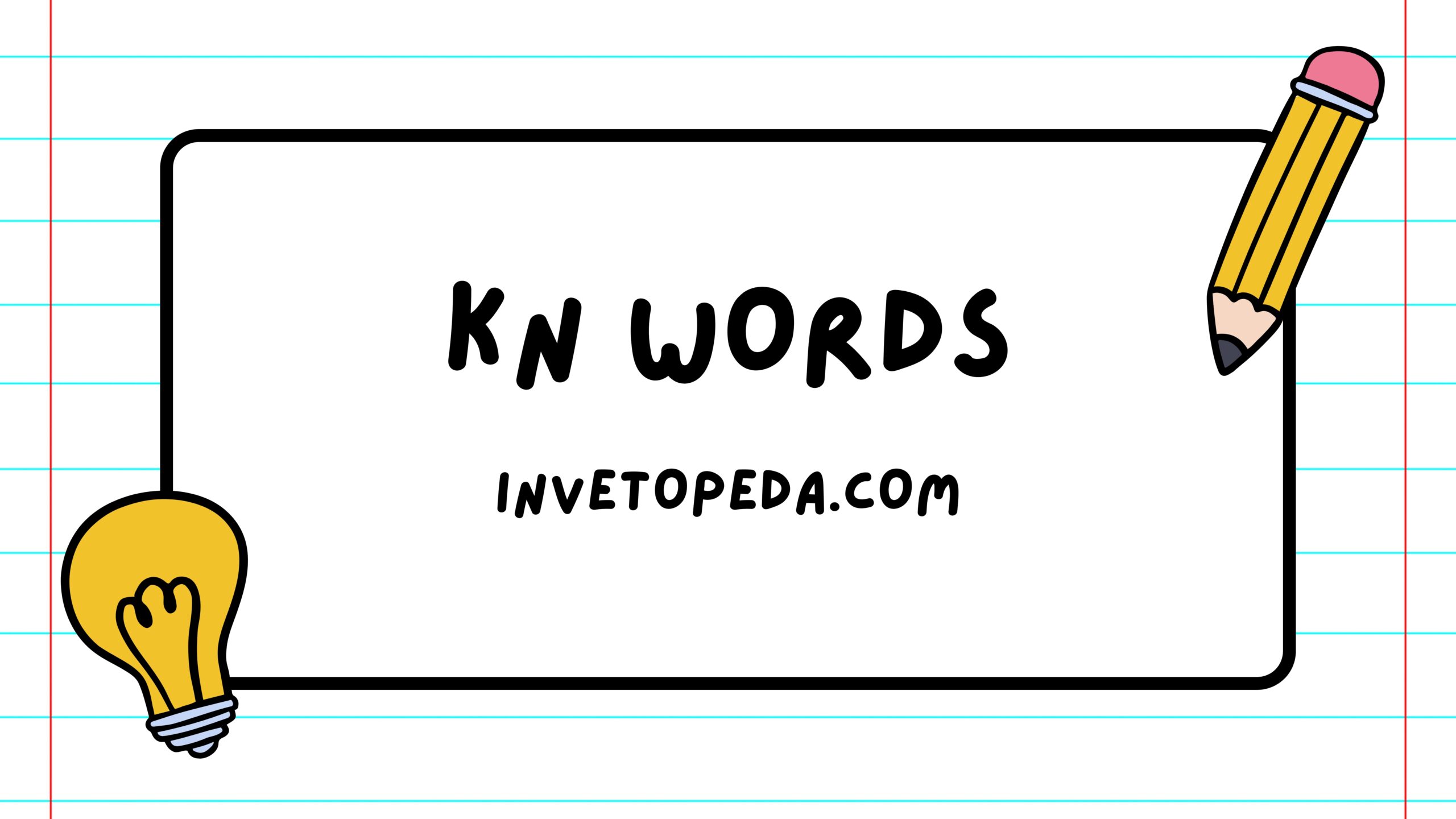Introduction
The language is a complex and interesting mechanism that constantly produces and introduces diverse number of words, satisfying different linguistic requirements. Of these, “Kn words” represent an individual subset with distinctive characteristics and significance. While not mentioned as frequently with the same frequency as different language categories, “Kn words” merit attention for their contributions to the language structure, the phonetics of language, and their use. This article will provide an understanding of “Kn word,” exploring their definition and classification, along with examples of the importance they have to research in linguistics and enhancing their exposure to search engines to draw a wider audience who are interested in studying the language and studies of language.
What Are “Kn Words”?
Definition of “Kn Words”
“Kn words” are a distinct group of terms within the English language that are distinguished by their consonant first cluster, which usually begins with the”kn “kn. ” They’re distinguished through silenced “k” at the start of the word. This can affect spelling and pronunciation.
Origin and Etymology
The old English consonant cluster term is the origin when the many word names started with the” kn” word instead of the” kn” term to make the” kn” sequence. The pronunciations evolved over the years to the extent that the “knee” went out as the pronunciation of the letter”k” but the spelling still had the same origins of the words. A few of them include, knock, knee, and knife, which still have the sound of k but with change in sound.
Characteristics of “Kn Words”
Phonetic Features
A lot of “kn word” begin with an unheard “k,” making their pronunciation different. They are used by those who don’t use the initial “k” sound, focusing on consonant vowels as well as consonant sounds. Examples:
- “Knee” is pronounced /ni”knee” //”/
- “Knife” is pronounced”/naIf*/
- “Knock” is pronounced”/naked” /na. “Knock” is said”/
Spelling and Orthography
Kn words Kn word usually contains the initial cluster kn, it is a word of Old English spelling. These words are spelled in regular spelling rules though they lack the use of k and therefore when the words are written in the English language it becomes easy to distinguish them there.
Usage and Context
“Kn word” are predominantly nouns. Some of them may be utilized as adjectives, verbs, and even other parts of speech, depending on their situation. They typically are used to describe objects, actions and other objects such as “knee” (body part), “knife” (cutting instrument)”, knock” or “knock” (sound or action).
Common “Kn Words” and Their Examples
Frequently Used “Kn Words”
This is a listing that includes some of the most well-known “kn word,” along with the definitions for each
- Knee: The joint connecting the lower leg and thigh.
- The Knife: A cutting instrument that comes with the knife.
- Knot Knot: A kind of fastening made by knotting the length of cord, string or rope.
- Knock: The goal is to strike something to catch attention.
- Knowledge Knowledge refers to information, the understanding acquired through the process of education or experience.
- Knight Knight was a soldier in the Middle Ages who possessed a prestigious position. Most often, they are mounted and equipped.
- Knotty Knotty is full of knots and intricate or hard.
- The knee is high. The knee extends toward the knee.
- Knob Handle, which is rounded or projected.
- Knit Fabric by looping yarn using needles.
Less Common “Kn Words”
While the entire mentioned above are common, certain “kn word” are less commonly used, yet nevertheless relevant:
- Knapsack Knapsack A backpack is transported in the rear.
- Knurl Knurl: An extremely small pattern of projection or groove. Usually, it is in the case of tools.
- Knave is a word which was employed for quite a while to refer to people who are dishonest.
- Knockout: The term is used to describe someone or something that has a striking appearance or stands out. Also, boxing words.
Significance of “Kn Word” in Language and Literature
Phonetic and Orthographic Impact
“Kn words” exemplify the way that spelling patterns from ancient times influence modern language. Their deliberate “k” demonstrates the evolution of pronunciation over time, which emphasizes the dynamic nature of these languages.
Educational Importance
Teaching of spelling and pronunciation requires the knowledge of kn word particularly among the non-native speakers attempting to learn English. These words illustrate the history of the English spelling as students get to learn the meaning of these words. It also creates awareness on how the pronunciation relates to spelling.
Literary Usage
Writers commonly employ “kn words” to evoke an impression of the historical background or provide some aesthetic appeal. In particular use of the term “knight” can evoke medieval images, while “knock” can set a suspense-inducing tone.
Challenges and Common Confusions
Spelling Difficulties
Students often confuse “kn word” with other words due to the absence of “k” and irregular spelling patterns. Learning and practice are essential to master the words.
Pronunciation Variations
Most of the kn word contain a silent k, and some accents or dialects may make sound similar to kn with the help of a particular accent or dialect. This can cause the sound of k to sound like k causing possible mispronunciations and misunderstanding.
Conclusion
“Kn words” are unique and a historically rich part of the English dictionary. The silenced “k” initial, rooted in Old English, provides insight into the history of the language, as well as the tradition of orthography. Being aware of and understanding “kn word” enhances vocabulary reading skills, as well as an understanding of the past of the study of linguistics. If it’s related to education, like reading or studying the language, “kn words” hold a significant place in the dictionary of the English language.

FAQs About “Kn Words”
What’s “kn words”?
“Kn word” are English words English that begin by consonantally forming the word “kn,” where the “k” is silent, as in “knee,” “knife,” as well as “knock. “
What do you think”k” is silent in “kn words?” “k” silent in “kn words”?
Silent “k” is an old original remnant of Old English. The pronunciation was changed in order to eliminate”k” sounds “k” sound, but the sound was still heard.
Can “kn words” be used to complement Verbs?
Yes. This is because “knock” is a verb meaning to strike the object. Likewise, “knot” can be used as a word meaning connect.
Are “kn words” common in everyday language?
Many “kn word” like “knee,” “knife,” and “knock” are very common but others aren’t commonly employed.
What is the process learners use to learn “kn words”?
Know how to spell, know common words and know how to say them as well as their origin such that you are able to further your ability to understand and apply such words.

